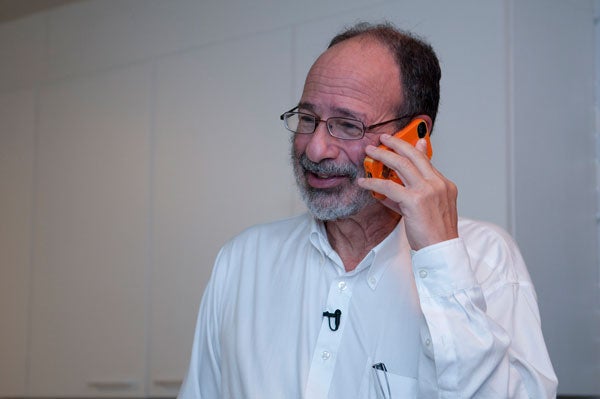|
October 15, 2012
Stanford visiting Professor Alvin Roth wins Nobel Memorial Prize in Economics
By Max McClure

Alvin Roth receiving a congratulatory phone call Monday morning.
Harvard economist Alvin Roth, who is transitioning to Stanford University, has been awarded the Nobel Memorial Prize in Economic Sciences for his work on market design. He shares the prize with Lloyd Shapley, professor emeritus at UCLA.
The Royal Swedish Academy of Sciences cited the researchers' contributions to "the theory of stable allocations and the practice of market design" in naming them for the $1.2 million prize.
Roth, a visiting professor and Stanford alumnus who will become a full Stanford faculty member at the start of 2013, is a pioneer in the field of game theory and experimental economics and in their application to the design of new economic institutions. As one of the first "microeconomic engineers," Roth has redesigned the market for kidney exchange, the organization that matches medical residents with hospitals, public school choice systems and a variety of other institutions.
"Professor Roth's contributions to his field are a remarkable achievement for him and for Stanford," President John Hennessy said.
The announcement makes Roth the 19th Nobel laureate among Stanford's current community of scholars.
Reached at home shortly following the announcement, Roth said that he felt "good, the same as anyone who wins the Nobel Prize."
"But at least in my case," he went on, "this represents a lot of people's work. It's good for the field of market design."
A press conference with Roth will be held at Stanford at 10 a.m. and will be available via live feed.
Bringing rigorous game theory approaches to bear on real-world, complex problems, Roth has long been at the forefront of economic design. In particular, Roth has made a number of innovative applications of matching theory.
"Matching," Roth has written, "is one of the most important functions of markets."
In the case of New York high schools, for instance, Roth faced an enormously charged situation. At the time, poor matches of schools and prospective students were so common that over a third of New York eighth graders chose not to participate.
Roth, along with then-graduate student Parag Pathak and economist Atila Abdulkadiroglu, redesigned the New York matching system, using a refined version of a "deferred-acceptance algorithm" – a mathematical approach originally devised by Shapley and the late UC-Berkeley mathematician and economist David Gale to describe marriage options.
The group's solution not only brought participation up to 93 percent but inspired the Boston public school system to approach Roth as well.
Roth's design of the New England Program for Kidney Exchange represents another large-scale, practical application of matching theory. In many cases, a healthy person would like to donate a kidney to a friend or loved one, but is medically incompatible. With paired kidney donation, however, that incompatible donor-recipient pair can trade their kidney to another mutually incompatible pair, while obtaining the kidney they need in return. The practice greatly increases the number of compatible kidneys available to a patient.
Roth famously dropped out of his Queens, N.Y., high school in his junior year. After taking weekend classes at Columbia University, Roth became a full-time Columbia student, earning an engineering degree before receiving master's and doctoral degrees from Stanford in operations research in 1973 and 1974, respectively. He is the George Gund Professor of Economics and Business Administration at Harvard University and Harvard Business School.
In addition to his many academic publications, Roth is the author of several standard texts in bargaining theory, experimental economics and game theory. He has received numerous awards for teaching and research, including Alfred P. Sloan and Guggenheim fellowships, and is a member of the American Academy of Arts and Sciences and the National Bureau of Economic Research.
Although he slept through the initial 3:30 a.m. call from Sweden, Roth didn't seem too fazed by the prospect of handling big news at an early hour.
"Coffee is a big part of science," he said.
-30-
|